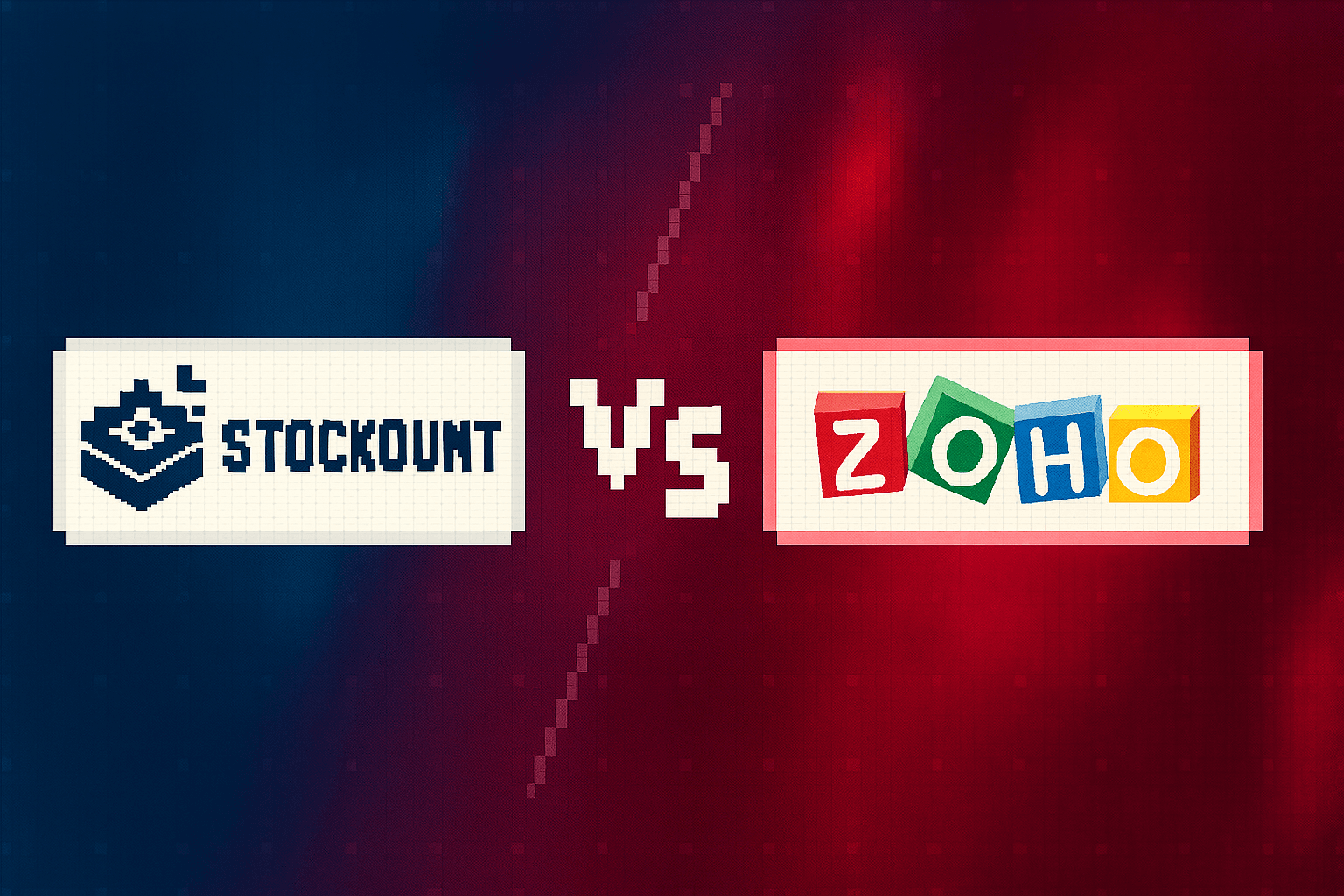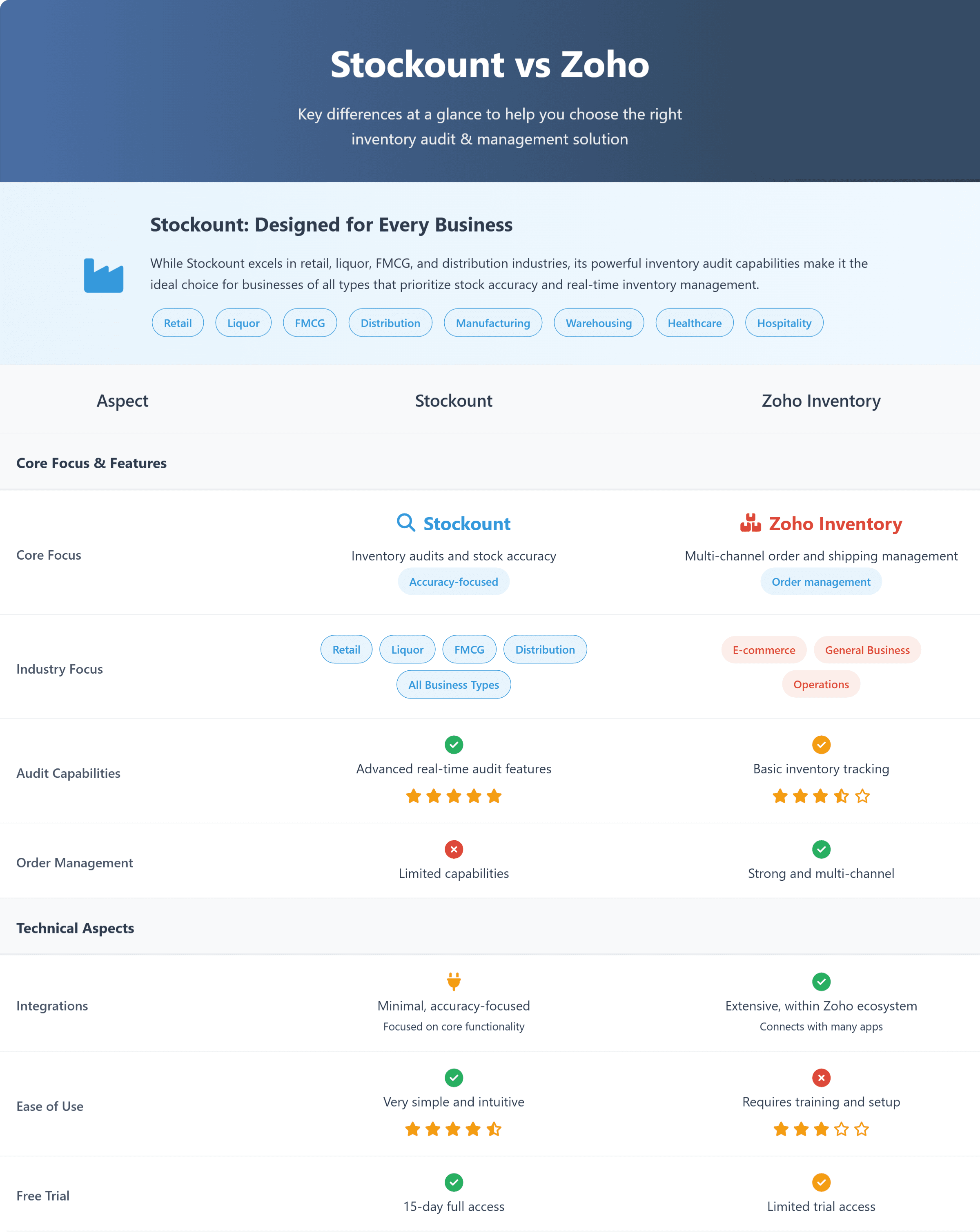Stockount vs Zoho Inventory: Which Fits Your Business Best?
August 21, 2025 | By Stockount

Inventory is the beating heart of every business. Whether you’re running a small neighborhood shop or managing a global eCommerce brand, your ability to track, audit, and manage stock directly impacts profits, customer satisfaction, and long-term survival.
Yet, one challenge remains universal: choosing the right inventory management tool.
Today, two names stand out in this space — Stockount and Zoho Inventory. While Stockount is a specialized inventory audit solutions built to deliver precision and prevent stock losses, Zoho Inventory is a multi-purpose suite designed for businesses that need order management, shipping, and marketplace integrations.
But here’s the real question: should you choose a specialist laser-focused on stock accuracy, or an all-in-one platform offering a broader set of tools? Let’s break it down.
Understanding Stockount: A Specialist in Inventory Audits
Stockount is a dedicated inventory audit and stock management platform built for businesses that cannot afford errors in their inventory data. It is widely trusted by:
Liquor stores and distributors
Supermarkets and hypermarkets
Retail chains
FMCG businesses
Its primary purpose is simple but powerful: deliver accurate stock audits and real-time insights to eliminate shrinkage, theft, and discrepancies.
Key features of Stockount include:
Real-time audit tracking
Loss and theft detection
Inventory optimization tools
Simple, user-friendly interface
15-day free trial with complete access
Stockount is not overloaded with unnecessary features. Instead, it focuses on solving the most pressing problem for retailers and distributors—accurate, fast, and reliable inventory audits.
Understanding Zoho Inventory: A Multi-Purpose Business Tool
Zoho Inventory, on the other hand, is part of the larger Zoho ecosystem. It integrates seamlessly with Zoho’s suite of applications, including CRM, accounting, HR, and marketing tools. Zoho Inventory is particularly useful for businesses that deal with multi-channel sales and shipping. Its strengths lie in:
Order management across multiple platforms
Shipping integrations with carriers like FedEx and UPS
Marketplace integration with Amazon, Shopify, and eBay
Automation for purchase and sales orders
Zoho Inventory is best suited for businesses that want a generalized, all-in-one solution rather than a specialized audit tool.
Stockount Vs Zoho

Ease of Use: Which Platform is Simpler?
The simplicity of Stockount is one of its greatest benefits. Even non-technical staff can learn the system within minutes, making it an ideal choice for retail and warehouse environments where speed matters.
By contrast, Zoho Inventory is powerful but complex. Because of its many capabilities, training and customisation frequently take longer. While this may be suitable for larger businesses, small to medium businesses may find the learning curve steep.
Audit and Accuracy: Stockount Takes the Lead
For businesses that need inventory accuracy, Stockount is the clear winner. With real-time audit tools, discrepancy detection, and theft/loss tracking, it ensures that every stock count reflects reality.
Basic stock tracking is available with Zoho Inventory; however, it lacks advanced auditing features. This makes it less ideal for industries like liquor distribution or retail chains, where even small errors can lead to significant financial losses.
Order and Shipping Management: Zoho’s Strongest Point
Where Zoho Inventory excels is in order and shipping management. It immediately connects with shipping companies and enables companies to handle sales from a variety of sources.
For example, an online seller managing stores across Amazon, Shopify, and Etsy can centralize all orders in Zoho Inventory. This simplifies fulfilment and removes the headache of managing several platforms.
Stockount does not focus on this area. Its primary mission is stock accuracy, not shipping logistics.
Scalability: Which One Grows Better with Your Business?
Stockount scales seamlessly for retail chains, distributors, and warehouses where stock accuracy is critical. As your operations expand, Stockount ensures every new location maintains the same audit precision.
Zoho Inventory scales well if your business expands into other areas like CRM, HR, or finance. Since it is part of a broad ecosystem, it allows businesses to centralize multiple processes under one suite.
Pricing: Transparent vs Tiered
Stockount: Offers transparent pricing with a 15-day free trial that unlocks every feature. This allows businesses to test its true capabilities before committing.
Zoho Inventory: Uses a tiered pricing model. While entry plans are affordable, advanced features often require higher-tier subscriptions or bundles with other Zoho applications.
Who Should Choose Stockount?
Stockount is perfect for businesses of all sizes and industries that cannot afford inventory errors. It is widely trusted by:
Liquor stores and distributors that need accurate audits
Supermarkets and hypermarkets managing thousands of SKUs
Retail chains where theft prevention is critical
Warehouses and logistics hubs requiring real-time discrepancy detection
Pharmaceutical and FMCG companies where compliance and precision matter
Manufacturers and wholesalers needing batch/lot control and stock visibility
E-commerce sellers who want reliable inventory accuracy across channels
👉 In short, Stockount is built for any business that values inventory precision, audit reliability, and loss prevention.
Who Should Choose Zoho Inventory?
Zoho Inventory is best for businesses that:
Sell on multiple e-commerce platforms (Amazon, Shopify, eBay, etc.)
Need centralized order & shipping management
Already use Zoho apps like CRM or Books
Handle import/export or wholesale operations
Want an affordable, scalable all-in-one suite
👉 Best for companies prioritizing multi-channel sales and logistics.
Final Verdict: Stockount vs Zoho
The decision ultimately depends on your business priorities:
If your top challenge is inventory accuracy, audits, and loss prevention, Stockount is the sharper, more effective tool.
If you need multi-channel order management and integrations, Zoho Inventory is the better fit.
Both solutions are valuable, but they solve very different problems. Choosing the right one depends on whether you prioritize precision or ecosystem integration. In the Stockount vs Zoho debate, there is no one-size-fits-all answer. Stockount is the specialist for businesses that live and die by their stock accuracy & inventory counting software, while Zoho Inventory is the generalist for businesses that thrive on multi-channel sales and ecosystem management. Evaluate your current pain points—whether it’s stock discrepancies or complex order flows—and choose accordingly. The right system will not only save you time but also drive significant improvements in profitability.
Top Questions About Stockount and Zoho Inventory Answered
1. What is the main difference between Stockount and Zoho Inventory?
Stockount specializes in inventory audits and accuracy, while Zoho Inventory focuses on multi-channel order and shipping management.
2. Who should use Stockount?
Businesses like liquor stores, supermarkets, retail chains, warehouses & all type of business prioritize stock accuracy and theft prevention.
3. Which platform is easier to use?
Stockount is simpler and faster for non-technical staff, while Zoho has a steeper learning curve due to its extensive features.
4. Which is better for preventing stock loss?
Stockount takes the lead with real-time audit tracking, discrepancy detection, and theft prevention tools.
5. What about pricing?
Stockount offers transparent pricing with a 15-day free trial. Zoho uses a tiered pricing model, with advanced features in higher plans.